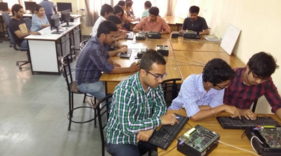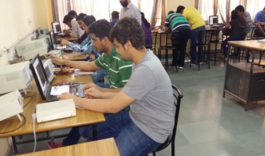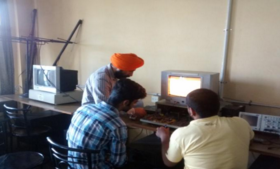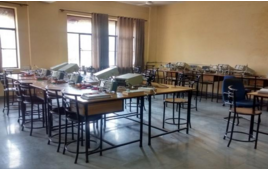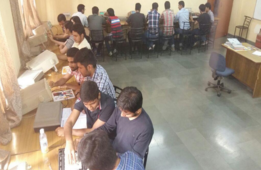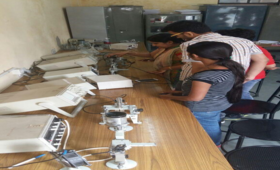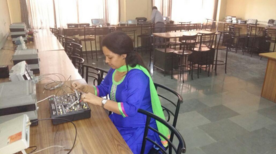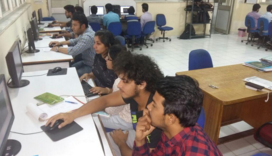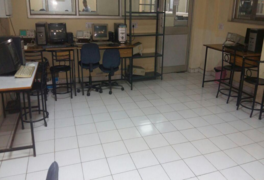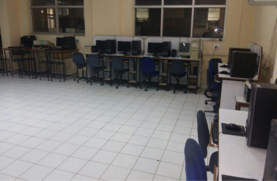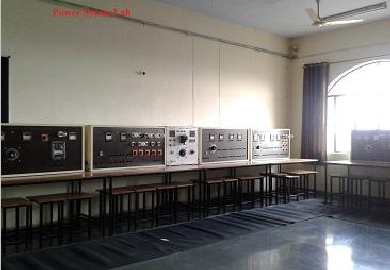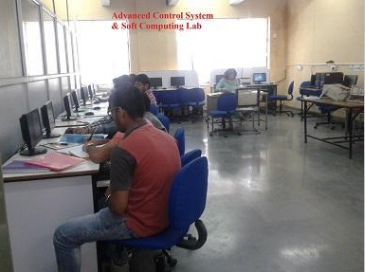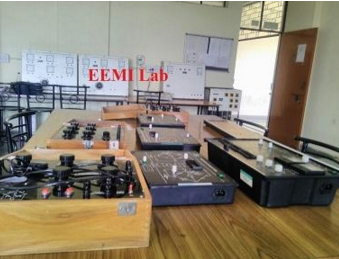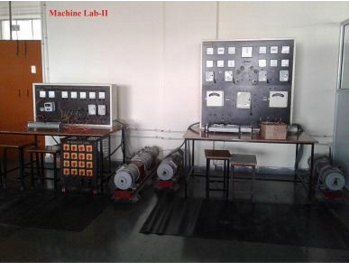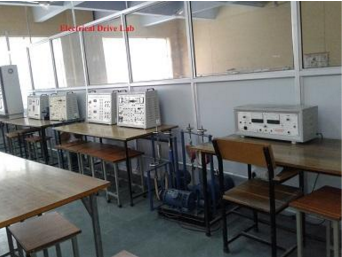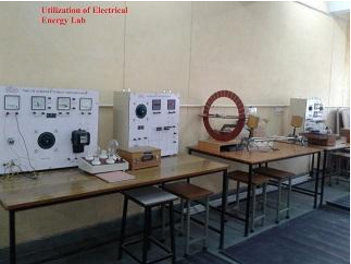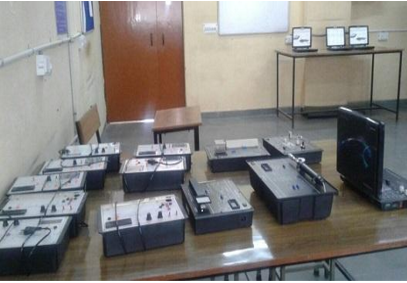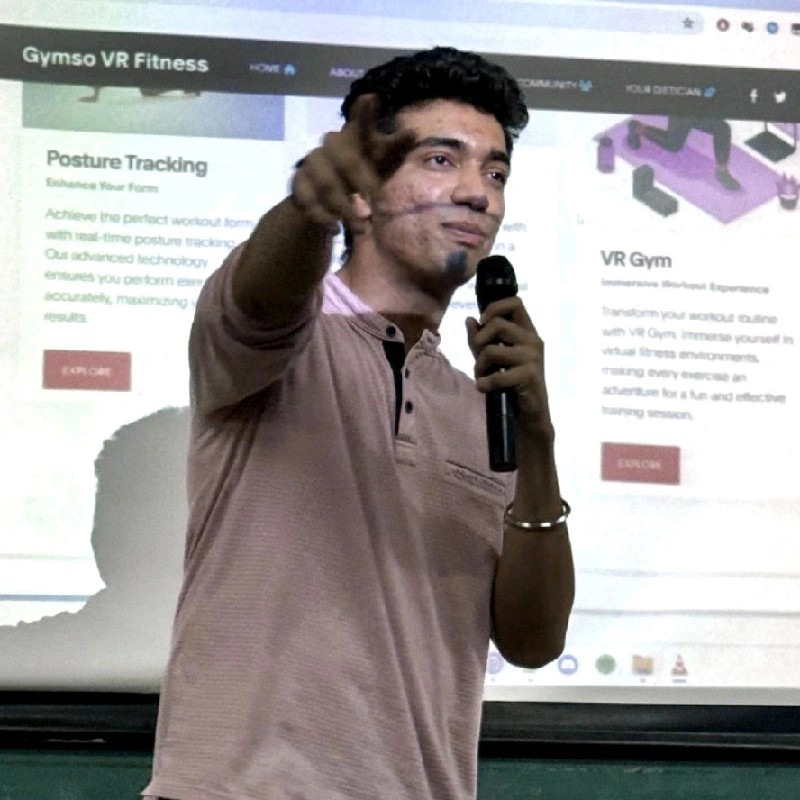Links
About
- • About MSIT
- • Vision & Mission
- • History
- • Facilities
- • Administration
- • Governing Body
- • From The Desk
Departments
- • CSE
- • IT
- • ECE
- • EEE
- • Applied Sciences
Student Section
- • Time Table
- • Attendance
- • Syllabus
- • NPTEL Videos
- • Student Societies
- • Grievances
- • Higher Studies
Committees
Department of Computer Science & Engineering
The computer labs in the CSE department are equipped with high-quality computers and software with good configurations. Students, faculty, and staff all have access to these labs, which offer various tools and technologies for a wide range of tasks such as creating websites, editing documents, completing class assignments, sending emails, conducting data analyses, and accessing library resources. Microsoft Windows software is available for word processing, statistics, spreadsheet work, and database management. Furthermore, a wide selection of other software programs are also available for use. The department consists of multiple labs, and the specifics of each lab are outlined below:
1. CN/OOPS LAB
CN/ OOPS Lab has computers of configuration:
DELL Desktop Intel Core™ 10700 CPU @2.90 GHz, i7 10th Generation, 8GB DDR4 RAM, 1TB HDD & have 01 Server- DELL Poweredge T430 Intex Xenon CPUES-2604 [email protected] GHz Processor, 16 GB RAM, 3 TB HDD SATA.
Computer Networking lab:
During the odd semester, the department conducts practical sessions on computer networks, which refer to the interconnection of computing devices capable of sharing resources and exchanging data. To transmit information over physical or wireless technologies, these networked devices employ a set of rules known as communication protocols. For the implementation of various programs based on computer networking, students are required to use Network Simulator NS 3.24.1 in conjunction with the Ubuntu 18.4 operating system
Object Oriented Programming
During the odd semester, practical sessions on OOPS (Object-Oriented Programming) are conducted in the lab. The purpose of this lab is to solidify students' comprehension of fundamental object-oriented programming concepts, such as objects, classes, subclasses, and methods, and their implementation in C/C++. Additionally, it offers an opportunity to practice non-object aspects of C++ (such as loops and conditionals) using Turbo C++.

CN/OOPS Lab View
2. OPERATING SYSTEMS LAB
Operating system Lab has computers of configuration:
DELL Desktop Intel Core™ 10700 CPU @2.90 GHz, i7 10th Generation, 8GB DDR4 RAM, 1TB HDD The systems are dual boot running both Windows-7 as well as CentOS.
Information Security:
In odd semester this lab is used for conducting practicals of Information Security in C language. Information security is of critical importance in this generation of digital communication using telephone lines and computer networks. The objective of this laboratory is to provide students research opportunity on data transmission security and data recovery. Simultaneously, complexities associated with threat to security on data transmission are also studied.
Operating systems:
The goal of this course is to have students understand and appreciate the principles in the design and implementation of operating systems software.

3. PROJECT/DMBI LAB
Project /DMBI LAB has computers of configuration:
Dell Intel Core i5 processor CPU , 7th Generation, 3.0GHz, 4GB RAM 1TB SATA.
Project Lab
The Department of Computer Science and Engineering houses a dedicated lab that is exclusively reserved for project work. This lab is specifically intended for use by final year students. It comprises computer systems with high-end configurations and licensed software that are relevant to the students' project requirements. All computers in the lab are equipped with internet connectivity, and UPS power backups and antivirus and other softwares are also installed based on the final year project group's demands. In addition, any necessary networking hardware and software are provided as needed.
DMBI LAB
During the odd semester, practical sessions on DMBI (Data Mining and Business Intelligence) are conducted in the lab. The primary objective of this lab is to educate students on the implementation of classical models and algorithms in data warehousing and data mining. It also aims to illustrate the types of patterns that can be identified through association rule mining, classification, and clustering. Towards the end of the lab, students are expected to compare and contrast different conceptions of data mining.

Project/DBMI View
4. STQA/ PPL LAB
STQA/ PPL LAB has computers of configuration:
During the odd semester, practical sessions on STQA (Software Testing and Quality Assurance) are conducted in the lab. The primary aim of this lab is to educate students about software testing, which plays a vital role in ensuring that software applications or products meet business and user requirements. Good test coverage is essential to thoroughly test the software application and ensure that it performs well and meets specifications.
In the lab, students are taught how to conduct practical tests on SmartBear software, which is used to ensure software quality and optimize the software development process.
PPL LAB
During the even semester, PPL (Programming Principles and Languages) lab is conducted. The lab's primary aim is to familiarize students with the concepts of syntax, translation, abstraction, and implementation. Additionally, it aims to teach students about data, data types, and basic statements. Practical sessions for PPL lab are conducted using various programming environments such as Turbo C++, VC Code, etc., which allow students to practice coding and apply the concepts learned in the lectures.

STQA/ PPL Lab View
5. ADA/DBMS Lab
ADA /DBMS Lab has computers of configuration :
Acer i5 Processor 2nd generation 3.0 GHz 4 GB RAM, 500 GB HDD Space, Wipro Intel Core 2 Duo 2.8 GHz, 2GB RAM, 320 HDD Space. Lab is being used for running multiple subjects.
Analysis and Design of Algorithms lab:
During odd semesters, the lab on Analysis and Design of Algorithms is conducted. This lab serves as an introduction to the fundamentals of computational complexity analysis and various algorithm design techniques. The lab aims to impart knowledge on both the underlying mathematical theory and practical considerations of efficiency.
To implement the algorithms, the lab requires the use of Turbo C7, which is a widely used programming environment that enables students to practice coding and apply the concepts learned in the lectures.
DBMS Lab
During the even semester, the lab on Database Management Systems (DBMS) is conducted. The primary objective of this lab is to provide students with an opportunity to apply the concepts learned in the DBMS subject. In this lab, students develop a database using Oracle11g, which is a widely used database management system, to implement various SQL-based queries. By practicing database design and implementation, students gain hands-on experience and develop practical skills in database management.

ADA/DBMS Lab View
6. JAVA LAB
Java Lab has computers of configuration:
Acer i5 Processor 2nd generation 3.0 GHz 4 GB RAM, 500 GB HDD Space.
This lab provides an overview of the Java programming language, covering its basics such as inheritance, virtual function calls, and the underlying mechanisms that support them. All the experiments in this lab are conducted using JDK (Java Development Kit) software, which provides an integrated development environment for writing, debugging, and executing Java programs. Through this lab, students gain a solid understanding of Java's fundamentals and develop practical skills in programming with Java.

JAVA Lab View
7. DATA STRUCTURES / WEB ENGG. LAB
DS / Web Engg. Lab have computers of configuration:
HP processors with 4GB RAM and 500 GB Hard Disk Space & Wipro processors with 2GB RAM and 320 GB Hard Disk Space.
DATA STRUCTURES LAB:
The laboratory is currently being utilized for conducting different subjects in a way that maximizes the use of resources. During the odd semester, the Data Structure (DS) lab is carried out in this space. The DS lab necessitates the use of Turbo C7 for the implementation of various data structure algorithms.
WEB ENGG. LAB
During the even semester, the Web Engineering lab is conducted in this laboratory. In this lab, students learn to analyze the elements and attributes of a web page, create web pages using XHTML and Cascading Style Sheets, build dynamic web pages using JavaScript for client-side programming, and generate XML documents and Schemas.

DATA STRUCTURES / WEB ENGG. Lab View
8. SOFTWARE ENGINEERING / MACHINE LEARNING LAB
SE / ML Lab has computers of configuration:
Wipro processors with 2GB RAM and 320 GB Hard Disk Space and one Wipro Xeon PC (Core 2 Duo 2.8 GHz, 4 GB RAM, 250 GB HDD Space)
This lab is being used for running various subjects in combination to make the optimal resource utilization.
Software Engineering Lab
During the odd semester, the SE lab is conducted with the objective of providing students with practical experience in various areas of software engineering and UML. These areas include identifying requirements, creating DFDs, designing behavior and structure using UML diagrams, implementation, testing, and more. Throughout the semester, students will work on an assigned project to gain a better understanding of the software development process in real-life scenarios. Practical sessions are conducted using Star UML
Machine Learning Lab
During the even semester, the ML lab is conducted, serving as a central hub for data science teams to develop, deploy, and operate machine learning solutions at scale. The lab utilizes the Weka tool for the execution of machine learning programs.

SOFTWARE ENGINEERING / MACHINE LEARNING Lab View
9. INFORMATION SECURITY/ MOBILE COMPUTING LAB
IS/ MC LAB has computers of configuration:
Acer i5 Processor 2nd generation 3.0 GHz 4 GB RAM, 500 GB HDD Space, HP processors with 4GB RAM and 500 GB Hard Disk Space & Wipro processors with 2GB RAM and 320 GB Hard Disk Space.
INFORMATION SECURITY
The purpose of this laboratory is to offer students research opportunities focused on data transmission security and data recovery. Additionally, the lab investigates the complexities associated with threats to data transmission security.
MOBILE COMPUTING LAB
The Mobile Computing Lab (M-Lab) explores the potential of using mobile and wireless computers and sensors to tackle various pressing issues in fields such as healthcare, conservation, transportation, education, and beyond.
|
S.NO. |
Lab |
SUBJECT |
SEM |
SOFTWARE |
|
ODD SEMESTER |
||||
|
1 |
ADA/DBMS LAB |
ADA (ETCS 351) |
5th |
Turbo C7 |
|
2 |
SE / ML LAB |
SE (ETCS-353) |
5th |
Star UML 5 |
|
3 |
DS / WE LAB |
Data Structures (CIC-209) |
3th |
Turbo C7 |
|
4 |
JAVA LAB |
OOPS (CIC-257) |
3rd |
Turbo C7 |
|
5 |
CN/ OOPS LAB |
Java (CIC-258) |
5th |
JDK |
|
6. |
STQA/ PPL LAB |
STQA (ETCS-454) |
7th |
Smart Bear |
|
7. |
IS/ ML Lab |
IS(ETCS 451) |
7th |
Turbo C7 |
|
8. |
Project Lab/ DMBI LAB |
Minor Projects (ETCS-461) |
7th |
As per requirement of students |
|
EVEN SEMESTER |
||||
|
9 |
ADA / DBMS lab |
DBMS (ETCS256) |
4th |
Oracle 11g |
|
10 |
SE/ML LAB |
ML (ETCS-454) |
8TH |
WEKA |
11 |
DS / WE Lab Engineering lab |
Web Engg. (ETCS 356) |
6th |
Notepad++ , Tomcat server, Java |
|
12 |
JAVA Lab |
JAVA (CIC-258) |
4th |
Java , Turbo C7 |
|
13 |
CN/ OOPS Lab |
CN (ETCS-354) |
6TH |
Ubuntu & NS3.24.1 |
14 |
Project Lab/ DMBI LAB lab Engineering lab |
DMBI (ETCS-457) |
8th |
WEKA |
|
15 |
STQA/ PPL LAB |
PPL (ETCS-458) |
8th |
Turbo C7 |
|
16 |
Operating System Lab |
OS (ETCS-352) |
6th |
Turbo C7 |
Department of Information Technology
Information Technology department labs are well equipped with computers of latest configuration with LAN connectivity and Internet connection. Department comprises of various labs and details of labs are as follows:
1. COA/WE Lab No.107
The COA/WE lab have requirements of the course curriculum prescribed by GGSIP University. It is well equipped with 20 systems of Acer i5 Processor 2nd generation 3.0 GHz 4 GB RAM, 500 GB HDD configuration with lab The students in this lab develop Networking programs, Java programs as well as programs for various Web based Applications.
To learn JAVA programs the systems are installed with JDK1.7 and Net beans IDE which is an Open Source project environment and provides support for several languages (PHP), C/C++, JavaScript, etc. The programs for Web Based Applications are developed using Net beans IDE and Apache Tomcat server. This lab provides the student with an opportunity to know about the various latest web technologies and a platform for research in computer networks.
COA (Computer Architecture & Organization) we use this lab in Odd Semester .The software requirements are JDK7, JUBINS SIMULATOR-8085, Window 7, 10

COA/WE Lab Lab View
2. Networking Lab (#108)
The Network Programming Lab under IT Department fulfils the requirement of Data Communication & Networks lab, Cryptography & Network Security and Ad hoc & Sensor Networks lab as per curriculum prescribed by GGSIP University. It is well equipped with 31 systems of Acer i5 Processor 2nd generation 3.0 GHz 4 GB RAM, 500 GB HDD configurations.
This lab also has Sonicwall TZ-500 Firewall and CISCO-L3 Switch. The students in this lab develop Networking programs and Cryptography programs. In networking, students get hands on training of design/simulation of computer networks using Network Simulator 3 (NS-3) and security protocols on Firewall. They also learn about various network topologies and network protocols like sliding window, UDP, TCP and many others and perform socket programming.

Network Lab View
3. Programming Lab (#110 - 1stFloor)
The Programming Lab have a capacity of 30 computers of Acer i5 Processor, 2nd generation 3.0 GHz 4 GB RAM, 500 GB HDD configurations and Dell OptiPlex Desktop i7 12th generation with 8GB RAM , 500 GB HDD , 19.5” LED Screen with dell Mouse and Keyboard. This Lab is prepared to allow students to practice and perform practical of Programming. Students are also encouraged to learn basic of programming on Turbo C++ software.

The Lab is well equipped with all advanced software's (Turbo C Version 4 Software) for practical applications. This lab serves as a platform for learning and implementing the Data Structure, lab in 'C' programming language. Lab Work is designed to help students to implement methods like Bubble Sort, Merge Sort, and Quick Sort etc. The goal of this lab is to provide a practical introduction of the internal operation of modern operating systems. The course will cover algorithms for processes and threads, mutual exclusion, CPU scheduling, deadlock, memory management and file systems.
4. DBMS/SE Lab
This lab is under the IT Department which includes the lab of Data Base Management System and Software Engineering which complete requirements of Course curriculum prescribed by GGSIPU. The Lab have a capacity of 20 computers: - Dell Desktop Intel ® Core ™ 10700 CPU @2.90 GHz, i7 10th Generation, 8 GB DDR4 RAM, 1TB HDD, TFT Screen Keyboard, Optical USB mouse, APC with power back up and WI-FI internet connectivity.
In DBMS lab, the students use ORACLE 9/11g. SQL stands for “Structured Query language” and can be pronounced as SQL or sequel (Structure English Query language). SQL is used for accessing and modifying information in the database.
In SE lab, the students use Rational Rose Unified modeling language (UML) tool / STAR UML 5 (freeware) software. The goal of this lab is to provide a practical introduction to understand the software engineering methodologies for project development and also to draw different UML diagrams for specified systems.

5. Networking & Computing Lab / Selected Topics of Recent Trends in IT Lab
This Lab is under IT Department, which includes the lab of Networking, Ad-hoc Sensor Networks, Soft Computing and the Selected Topics of Recent technologies (like Machine Learning, Data Science etc.) which complete the requirements of the course curriculum prescribed by GGSIP University. It is well equipped with 14 systems of Acer i5 Processor, 2nd generation, 3.0 GHz, 4 GB RAM, 500 GB HDD configuration, 7 systems of Intel Core 2, 2.93 GHz, 4 GB RAM, 500 GB HDD DVD R/W, 1 systems of Wipro Core 2, 2.93 GHz, 2 GB RAM, 320 GB HDD DVD R/W; configuration with lab area of 72.8 Sq. mts.
The students in this lab develop Networking programs and various networking-based Applications. In networking, students get hands on training regarding the design and simulation of computer networks using Network Simulator 3 (NS3). They also learn about various Ad-hoc sensors network concepts and network protocols. To learn Soft Computing, the students used open source Sci Lab. This lab also provides the student with an opportunity to know about the various latest networking platform and latest technologies for research.
Note: Previously the name of this lab was Language lab and due the change in Syllabus this lab is renamed
6. Data Structure Lab / Probability, Statistics and Linear Programming Lab
Data Structure Lab / Probability, Statistics and Linear Programming Lab: has computers of configuration of which are , Acer i5 Processor 2nd generation 3.0 GHz 4 GB RAM, 500 GB HDD Space, The students practices programming problems in various courses as prescribed by GGSIPU like Data Structures, Probability, Statistics and Linear Programming, Computational Methods by practicing various programs in Turbo C/C++ Software, SciLab. The Lab is well equipped with advanced software (Turbo C++ and SciLab Software) for practicing programming in multiple areas. In the odd semester duration Data Structure (DS) lab is executed.
The DS lab requires Turbo C7 for the implementation of various algorithms of Data Structure, Computational Mathematics Lab which uses Turbo C7 for the implementation of numerical method programs. In the even semester duration Probability, Statistics and Linear Programming (PSLP) lab is executed. In PSLP lab various probability distributions, linear programming based experiments are performed using SciLab.
Note: Previously the name of this lab was DS/ Maths Lab, but due to updates in the syllabus it was renamed

7. Project Lab
IntroductionProject laboratory has been set up in the Department of Information Technology to promote innovation/research and development activities in the core and interdisciplinary domains. The lab is utilized by the students for their project work, and preparing for competitions such as E-yantra robotic project competition, Hackathon, Ideathon, Confluence etc.
Objective of the Laboratory:
- To provide state-of-the-art facilities such as GPU system and latest CPU systems.
- To provide easy access to licensed and open-source tools to the students.
- To foster a strong work ethic among students.
- To unleash the creative potential of the students by motivating them to take part in state level competitions.
- To enhance their understanding of classroom teaching.
- To prepare our students according to the current requirements of the Industry.
|
S.No |
Lab |
Subject |
Semester |
Software |
|
|
1 |
COA/WE Lab No.(#107) |
Programming in Java (CIC-258) Web Engineering (ETCS 356) |
4th Sem 6th Sem |
Jdk,Java Script |
|
|
2 |
Networking Lab (#108) |
Data Communication and Networks Lab (ETEC-358) Advanced Computer Networks Lab (ETIT-453) Cryptography and Network Security Lab (ETIT-455) Ad hoc and Sensor Networks Lab(ETEC-458) |
6th Sem 7th Sem 7th Sem 8th Sem |
Windows 7/10 (licensed) Ubantu/Centos (Freeware) Tuboo C++ (Freeware) NS-3 (Freeware) Packet Tracer 7.2 (Freeware) |
|
|
3 |
Programming Lab |
Data Structure(CIC255) ADA(: ETCS 351) Operating System (ETCS-352) Mobile Computing(ETIT-452) Big Data(ETIT-456) |
4th/3rd Sem 5th Sem 6th Sem 8th Sem |
TurboC, onlinecompiler, DevC++ TurboC,online compiler, DevC++ NokiaMobile Toolkit R Studio |
|
|
4 |
DBMS/SE Lab (#111) |
DBMS (CIC 256) SE (CIC 357) |
4th Sem 5th Sem |
Oracle 9g/11 g starUML 5, NS3,Weka 3.9 |
|
|
5 |
Networking & Computing Lab/ Selected Topics of Recent Trends in IT Lab (#01) |
STRTIT (ETIT-458) ASN(ETEC-458) DCN(ETEC-358) E Commerce(ETIT-458) |
8th Sem 8th Sem 6th Sem |
Weka ns3 SciLab |
|
|
6 |
Data Structure Lab / Probability, Statistics and Linear Programming Lab(#02) |
Data Structures(CIC255) Probability, Statistics and Linear Programming Lab(BS-252) |
3th Sem 4th Sem |
Turbo C SciLab |
|
|
7 |
Project Lab |
Minor Project(ETIT-463) Major Project (ETIT-460) |
7th Sem 8th Sem |
Python, Java, sci Lab etc. |
|
Engineering is concerned with applying knowledge in electronics to facilitate communication and solve engineering problems. The lab curriculum is organized such that it enables students to get a strong foundation on various aspects of Electronics and Communication Engineering such as Electronic Devices lab, Digital systems Design lab, Digital signal processing, Microprocessors and Microcontrollers, Signals & System Lab, VLSI design, Digital communication Lab, Control Systems lab, Microwave engineering Lab and Project lab etc. The students are also provided opportunities to choose specialized elective labs to focus on their identified areas of interest such as Embedded Systems lab, Mobile Computing lab, Advanced VLSI and Power Electronics lab etc.
LAB VIEW
|
Microprocessor & Microcontroller Lab |
Electronic Devices Lab |
|
Consumer Electronics Lab |
Project Lab |
|
Analog Electronics Lab |
Microwave Engineering Lab |
|
VLSI Lab |
Communication Systems Lab |
|
DSP Lab |
Control Engineering Lab |
List of labs in ECE Department
|
S.no. |
Name of Lab |
Code |
Semester |
|
1 |
Electronics Devices Lab |
ETEC-156 |
2nd |
|
2 |
Analog Electronics– I |
ETEC-251 |
3rd |
|
3 |
Switching Theory & logic Design Lab |
ETEC-253 |
3rd |
|
4 |
Electronic Instruments & Measurements Lab |
ETEC-257 |
3rd |
|
5 |
Signals & systems Lab |
ETEC-259 |
3rd |
|
6 |
Communication system Lab |
ETEC-256 |
4th |
|
7 |
Analog Electronics –II Lab |
ETEC-254 |
4th |
|
8 |
Digital System Design Lab |
ETEC-351 |
5th |
|
9 |
Control system Lab |
ETEL-355 |
5th |
|
10 |
Microprocessors & Microcontrollers lab |
ETEC-355 |
5th |
|
11 |
Digital Communication Lab |
ETEC-357 |
5th |
|
12 |
Microwave Engineering Lab |
ETEC-352 |
6th |
|
13 |
VLSI Design Lab |
ETEC-354 |
6th |
|
14 |
Digital signal processing Lab |
ETEC-356 |
6th |
|
15 |
Optical and Wireless Communication Lab |
ETEC-451 |
7th |
|
16 |
Embedded System Lab |
ETEC-453 |
7th |
|
17 |
Satellite and Antenna Lab |
ETEC-452 |
8th |
|
18 |
Digital Image Processing Lab |
ETEC-454 |
8th |
|
19 |
Project Lab |
- |
7th/8th |
Department of Electrical and Electronics Engineering
The Electrical & Electronics Engineering Department at MSIT is fully equipped with state-of-the-art equipment in its various laboratories to provide research experiences and training which supports the concepts learnt in theory subjects of course curriculum. The department currently offers two laboratory courses to undergraduate students of all the branches at the college and 10 additional laboratories to undergraduate students of EEE branch exclusively.
The department is quite boastful about a few hardware laboratories like: Machine Lab, Power System Lab, Measurement & Instrumentation Lab, Electric Drives Lab and Power Electronics Lab.
Besides the above mentioned hardware laboratories of the department, there is a computer lab with latest Intel i5 processors. This lab acts host to all software based requirements of the department. It is equipped with Matlab software package with tool packages including Neural and Fuzzy System, Image Processing, Digital Signal Processing, Control Systems and Optimization Tool Box. It has additional software namely, DigSilent Power Factory with 25 nodes for study and analysis of power system.
|
Power Systems Lab.
|
Soft Computing Lab/Scientific Computing Lab./ Advanced Control Lab.
|
|
Power Electronics Lab
|
Circuits & Systems Lab
|
|
Electrical And Electronics Measuring Instruments Lab.
|
Electrical Machines Lab.
|
|
Electrical Drives Lab.
|
Utilization Of Electrical Energy Lab
|
|
Name of Laboratory |
Major Equipment/Facilities/Usage |
|
Power Systems Lab. |
|
|
Soft Computing Lab/Scientific Computing Lab./ Advanced Control Lab. |
|
|
Power Electronics Lab |
|
|
Circuits & Systems Lab |
|
|
Electrical Machine-I Lab. |
|
|
Utilization Of Electrical Energy Lab |
|
|
Electrical Machine-II Lab. |
a) Torque b) Output power c) Input power d) Efficiency e) Input power factor
|
|
Electrical And Electronics Measuring Instruments Lab. |
|
|
Sensors & Transducers Lab. |
|
|
Electrical Technology Lab. |
|
|
Electric Drives Lab. |
|
Department of Applied Sciences
Applied Sciences is the backbone of Engineering. The Department of Applied Sciences in Maharaja Surajmal Institute of Technology comprises of Physics, Chemistry, Mathematics, Communication Skills, Organizational Behavior and Mechanical Engineering. All the laboratories have up to date experimental set ups to expose the students to new trends in the field of Applied Sciences. The workshop is also equipped with the state of the art machines. A Language Laboratory has been set up exclusively for the 3rd year students to cater to the additional load. The laboratory is equipped with systems of latest configuration.
- Applied Pyshics Lab
- Applied Chemistry Lab
- Applied Mechanics Lab
- Workshop
- Engineering Graphics Lab
- Language Lab
Applied Physics Lab
Physics is an experimental science. The concepts and relationships introduced in the lecture part of the course describe the general nature and behavior of real phenomena. Physics laboratories provide an experimental foundation for the concepts introduced in the lectures. It is important that student have an opportunity to verify some of the ideas for themselves.
The experiments in Applied Physics Lab are designed to illustrate phenomena in different areas of Physics and to expose students to measuring instruments, conduct the experiments with interest and an attitude of learning. This course on Physics lab is designed with 12 experiments in each semester. It is common to all branches of Engineering in B. Tech. Ist year. The objective of the course is to offer the students essential exposure to various experimental skills. The experiments conducted in the Physics Lab relate to the areas of Physical Optics, Lasers, Fiber Optics, Sound, Mechanics, Electricity & Magnetism and Basic Electronics. The students also learn to use tools such as Screw gauge, Vernier Calipers, Physical Balance, Spectrometer and Microscope.
Applied Chemistry Lab
This Lab is prepared for B. Tech. students to perform experiments of Applied Chemistry and Environmental Studies subjects. The lab is well equipped with all necessary apparatus and glassware. The chemistry lab is equipped with Water Distillation Unit, BOD Measurement Unit, pH Meter, Conduct meter, Heating Oven, Hot Plate Magnetic Stirrer and Physical Balance. The experiments in the Chemistry Lab include Volumetric analysis, surface tension , viscosity, Proximate analysis of coal, pH conductivity, moisture content, TDS of water/ soil/sludge samples, strength of residual chlorine, among others.
Applied Mechanics Lab
The objective of the lab is to perform experiments which are related to engineering mechanics subject (Statics and Dynamics) in order to understand the behavior of different mechanical equipments and verify the theory of Engineering Mechanics. The Engineering Mechanics Lab consists all essential instruments such as Screw Jack, Truss, Simply Supported Beam, Jib Crane, Wheel And Axle Weight Lifting Machine, Weight Lifting Machine by Worm and Worm Wheel, Bell Crank Lever, Inclined Plane For Statics Friction etc.
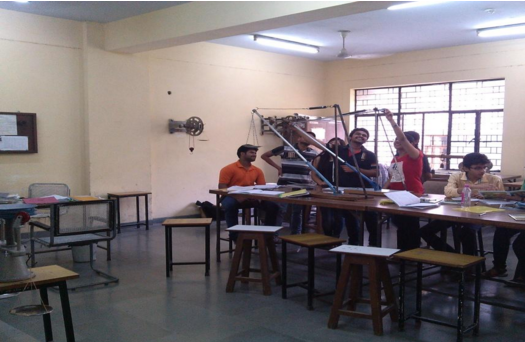
Work Shop
The Applied Sciences Workshop is prepared for the Ist year students of all streams to practice and develops skills to use machine, equipments, tools and measuring instruments. The workshop practice lab includes practical work in Carpentry, Welding, Fitting, Foundry And Sheet Metal Shop. The dedicated and experienced teachers in workshop assist the students with their practices. The workshop contains all necessary equipments such as Spot Welding Machine, Arc Welding Machine, Power Hacksaw Machine, Grinding Machine, Oxy Acetylene Welding, and Drilling Machine.
Engineering Graphics Lab
The fully air conditioned Engineering Graphics Lab is used for the students of B Tech. Ist Year in all streams of Engineering. The students learn basic concept of lettering, scales, and orthographic projections of points, lines, planes solids and isometric projection of various objects. Engineering Graphics Laboratory is complete with all the equipments such as Drawing Boards and module of different types of solids with working capacity of 75 students. We have dedicated and experienced teachers in the Lab to assist the students with their experiments.
Language Lab
This Lab is prepared for the Vth semester B. Tech students to perform Listening, Speaking and reading activities as a part of the Communication Skills for Professional subject. The Language lab is equipped with 30 computers with the following configuration:
ACER, CPU P-V Core i5 processor, 2nd generation,3.0 GHz, 4GB DDR3 RAM,500 GB HDD, DVD R/W, Keyboard, Optical Mouse, TFT 18.5 Color Monitor, 600 V APC UPS 23, HP MSIT 308 CPU 351, Intel Core 2 Due, 2.93 GHz, 4 GB RAM,500 GB HDD, DVD R/W, Keyboard, Optical Mouse, TFT 19.5 Color Monitor, 650 V APC CPU 7. UPS APC 600V 30.
All the systems in the Language Lab have Orell Digital Language Lab Software installed. The software is used for various communicative activities such as, Listening and Comprehension Reading, Writing, Conversation, Oral Presentation etcetera.
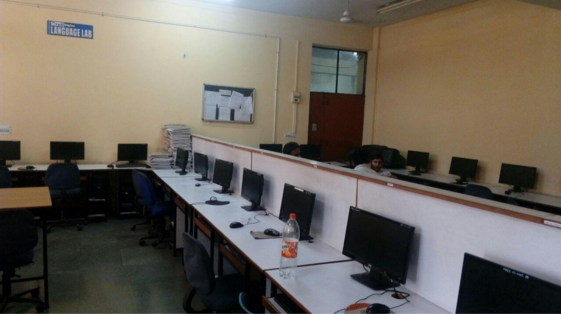
Central Library
Maharaja Surajmal Central Library supports the teaching & research programmes of three Institutes namely, Maharaja Surajmal Institute & Maharaja Surajmal Institute of Technology. All students, faculty members and employees of the Institute are entitled to make use of the Library facilities. The Library has a well-stocked fully computerized library with latest editions of books by eminent authors & is having a huge collection of books on education, management, computer science, engineering, pharmacy, science and humanities to cater to the needs and requirements of the faculty as well as students.
Library has also a Research Wing for scholars where scholars are getting special reference material and rare collections of manuscripts for their research work on community.
BOOK BANK
Students can avail Book Bank facility which was initiated during 2006-2007. All the students joining the institute are being given a set of text books every year. This has come as a boon to the students who do not have to buy costly books for their academic preparations.
For more details, please visit:
https://sites.google.com/site/centrallibrarymaharajasurajmal/
HOSTEL AND CANTEEN
Hostel: The Maharaja Mahendra Pratap Hostel provides accommodation to around 200 boys and 100 girls in a spacious and elegant four-storeyed building with all connected facilities. Hygienic and nutritious food is provided at a reasonable cost.
Staff Accomodation: Quarters are provided to the teaching and non teaching staff with all latest facilities on reasonable charges. All the quarters are well furnished.
Canteen: The canteen of MSIT is well organized having a seating capacity of 60-70 persons simultaneously with clean surroundings. The eatables of good quality are available at reasonable cost.
SPORTS
Institute has well maintained play ground for various games such as football,volleyball, cricket, badminton etc. Facilities for indoor games such as carrom, table tennis, chess and chinese checkers are also available. These extra curricular activities help in building up personality and confidence in the students. Bank: The institute has on campus banking facility .
Medical
Psychologist
C-2B Janakpuri
Ph. - 01125552023
